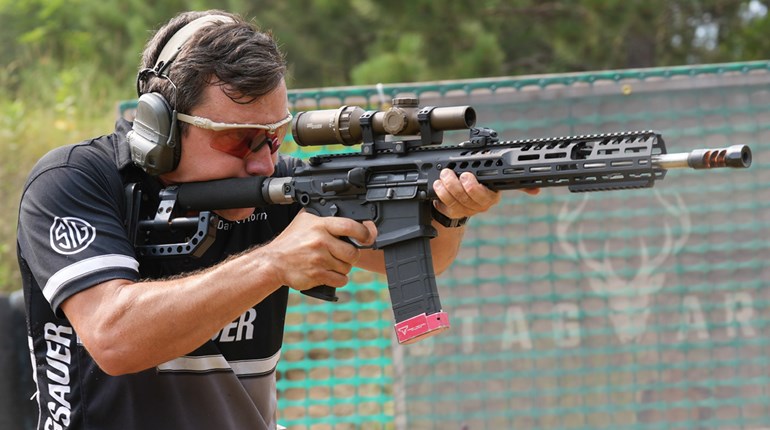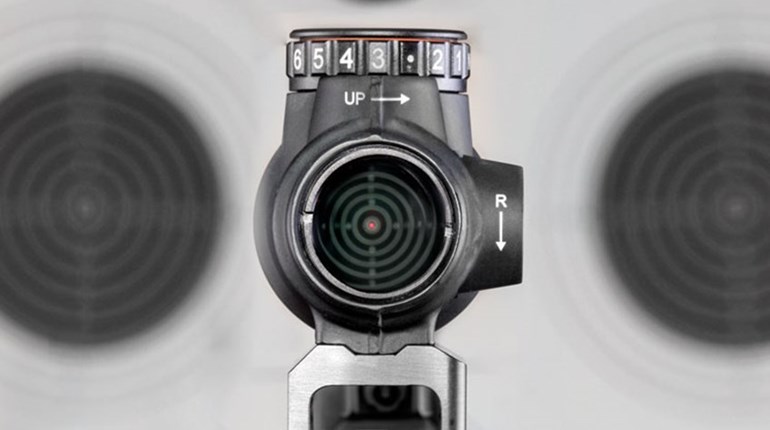
Ammo gauging is the process of using a machined gauge to check each round of ammunition. The process ensures the ammo functions properly. Gauges are machined to replicate SAAMI chamber specifications and sold by different manufacturers. Most everyday gun owners do not own an ammo gauge (unless they reload their ammo). There are, however, reasons that more should invest in one. Here are the two most important reasons.
Safety First
Safety is the biggest reason to gauge ammunition, as it offers another opportunity to put hands and eyes on the ammo—you can actually feel it.
What are you looking and feeling for? First, you are looking to see that the ammo fits into the case gauge correctly. Generally, they should fit into the gauge with the bottom flush, and they should drop freely out of the gauge without getting stuck. Be sure to refer to the manufacturer’s recommendations for which gauge to buy for the caliber you are gauging.
Aside from how each round fits into the gauge, be sure to examine the primers as you gauge the rounds. Are they flush with the bottom of the case? Are any high or “proud” from the primer pocket? Do any look dented or squished?
When you load each round into the gauge, you will feel it. Look for inconsistencies, scratches or dents. Sometimes unexpected things come up, and putting your hands on the round is using your sense of touch to assess the ammo. It’s one reason I load mags with my hands, not with a magazine loading tool. You feel the round more thoroughly than you do when you just toss rounds into a loading tool. I’ve caught things over the years that convince me this is another valuable layer in assessing my ammo.

Gauge Especially if you Reload
You may reload or shoot ammo that has been reloaded, or maybe you shoot remanufactured ammo. If you do any of these, it is imperative that you gauge your ammo. Private individuals who reload for themselves will generally gauge their ammo. This is because they know that despite inspecting brass, and following all the rules, sometimes we humans miss things, like a split case that didn’t show up when you cleaned the brass, but with a seated bullet, is now visible.
You might feel things like scratches from a reloading die that you didn't know about—sideways/crushed/high primers, split case necks, dented case shoulders. There are many things that can happen to your brass, and the time spent gauging ammo isn’t just about whether it fits in the gauge correctly, it’s also really looking at the work you have done.
If you reload with a progressive loading machine, the chance of having a primer not seated correctly is more common than when you hand-prime every case. Inspecting the ammo visually is a huge part of gauging and important for reloaded ammo.
Gauging ammo after you reload the first few rounds helps to ensure your reloads are sized correctly. This can save you a lot of frustration before you load hundreds of rounds. Depending on the caliber, it’s even a good idea to gauge every couple hundred rounds. Sizing and seating dies can back out of the press on a single stage press or the holder they fit into on a progressive machine. If you gauge every so often, you can potentially save yourself from trouble that can’t be fixed later, except by pulling bullets and powder and starting over.
Competition/Personal Defense: Every Round Must Work
Another main reason you should consider gauging ammo is regardless if you are competing or using ammo in your personal defense firearm, you want those rounds to work without fail.
It would be a wasted effort to fly thousands of miles or half-way round the world for a big event, only to have a malfunction due to a defect in ammo. Even when we travel to another country and have factory ammo, we still gauge every round! This summer, I traveled to Finland for a rifle world shoot and the first night after we checked into the match and picked up our ammo was spent gauging it all.
For your personal defense firearm, knowing that you are potentially trusting your life to those rounds is a reason to gauge your ammo. It’s a small step and not time-consuming, it just costs the price of the gauge and your effort!
Don’t have a gauge?
Even if you do not own an ammo gauge, you can still assess your ammo, depending on your gun. If you are, say, planning to shoot a pistol match and you don’t have a case gauge, but now this article has you thinking, fear not, you can actually “barrel gauge” the ammo. This is only for those who know how to disassemble their gun and remove the barrel. But instead of dropping your round into a gauge, you drop them into the barrel. When you drop it in, it should fit so the bottom of the round is flush with the hood of the barrel. This works in pistol models like a 1911, SIG or Glock, where the breech face and barrel hood are both flush.
Often the barrel is more forgiving than a case gauge, so you might be surprised to compare the two (barrel vs case gauge.)
Ammo gauging is not a necessity with factory rounds, but it is a tool you can use to ensure reliability no matter what type of ammo you are using. It’s also a great way to learn about the specifics of your ammo.















































